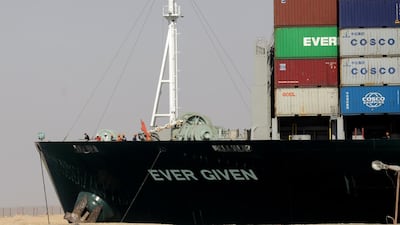An Egyptian court has adjourned a compensation hearing to allow more time for a negotiated multi-million dollar settlement over the container ship that blocked the Suez Canal.
The dispute revolves around the amount that the Suez Canal Authority could receive for financial losses caused when the vessel Ever Given ran aground, blocking the crucial waterway for six days in March before it was freed in a complicated salvage operation.
The court in Ismailia town postponed the hearing to June 20 after requests from lawyers representing the Suez Canal Authority and the owner of the 400-metre Ever Given.
“There are endeavours to reach a settlement and because they are good clients, we are asking the court to postpone to negotiate and study the offer submitted by the owners,” Nabil Zidan, the lawyer for the Suez Canal Authority, told the court.
"Negotiations are on and there's flexibility from both sides," said Ahmed Abu Shanab, lawyer for the ship owner.
The authority was initially claiming more than $916 million in damages. But it said it had miscalculated the value of the cargoes aboard the ship, and the figure was lowered in out-of-court negotiations to $550m.
The vessel's insurers said the amount was still too high.
The Ever Given's owner previously offered to pay $150m, according to the authority, which said the figure did not cover losses of transit fees, damage to the waterway and costs of equipment and labour for the salvage operation.
The Ever Given, one of the world's largest container ships, became jammed across the canal in high winds on March 23, halting traffic in both directions and disrupting global trade.
Hundreds of ships waited in place for the canal to be unblocked, while some ships were forced to take the much longer route around the Cape of Good Hope at Africa’s southern tip, requiring additional fuel and operating costs.
About 10 per cent of world trade flows through the canal, an important source of foreign currency for Egypt. About 19,000 vessels passed through the canal last year, official figures showed.


